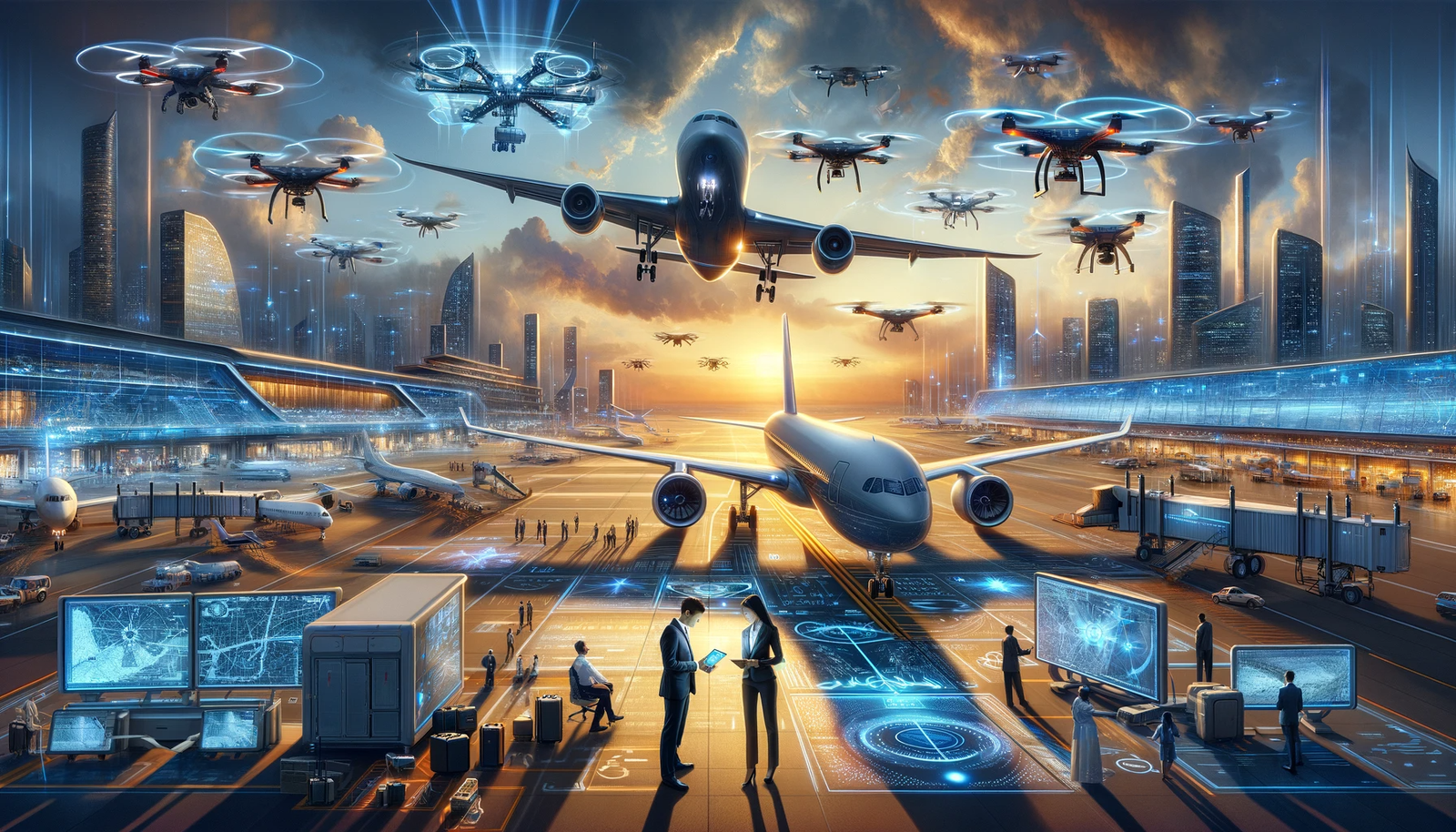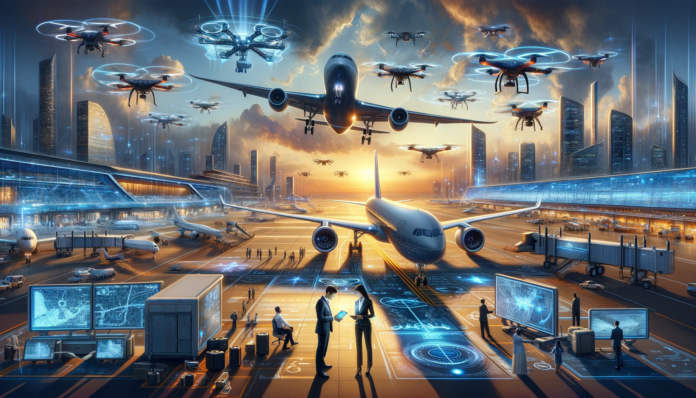
Get ready to take flight into the fascinating world of drone technology and its impact on the aviation industry. From delivering packages to capturing stunning aerial footage, drones have rapidly transformed how we perceive and navigate the skies. In this article, we will explore the remarkable influence of drone technology on the aviation industry and how this innovative technology has revolutionized various sectors within it. So fasten your seatbelts and prepare for a thrilling journey through the skies of technological advancement!
Safety and Efficiency Improvements
Integration of drones in airspace management
The integration of drones in airspace management has brought about significant safety and efficiency improvements in the aviation industry. By incorporating drones into existing air traffic control systems, airspace management can be better optimized to accommodate the growing number of unmanned aerial vehicles. Drones can be utilized for various purposes, such as aerial surveillance, inspection, and monitoring, providing real-time data to enhance situational awareness. This integration ensures better coordination and communication between traditional aircraft and drones, reducing the risk of accidents and collisions.
Reduced human error
One of the key advantages of using drones in aviation is the reduced risk of human error. Pilots and air traffic controllers are prone to making mistakes, but drones, being programmed machines, execute tasks precisely and consistently. With autonomous flight capabilities, drones can follow pre-determined flight paths and operate with high precision, eliminating the potential for human error. This significantly enhances safety in critical operations like search and rescue missions and surveillance tasks, where accuracy and reliability are paramount.
Enhanced surveillance and inspection capabilities
Drones have revolutionized surveillance and inspection capabilities within the aviation industry. Equipped with high-definition cameras and advanced sensors, drones can capture detailed imagery and collect data in a faster and more efficient manner than traditional methods. Inspection of infrastructure such as airports, runways, and towers can now be carried out with ease and accuracy, reducing the need for manual inspections that are time-consuming and sometimes dangerous. Furthermore, drones can be deployed for environmental monitoring, ensuring the safety and integrity of aviation-related activities in sensitive areas.
Impact on Commercial Operations
Delivery services
The advent of drone technology has unlocked new possibilities for delivery services. Drones offer a faster and more cost-effective way to transport goods, especially in areas with challenging terrains or limited infrastructure. With the ability to fly directly to a designated location, drones eliminate the need for ground transportation, reducing delivery time and improving efficiency. This has the potential to revolutionize e-commerce, enabling companies to provide same-day or even same-hour delivery services, and expanding their customer base by reaching remote areas that were previously unreachable by traditional means.
Aerial photography and videography
Drones have transformed the field of aerial photography and videography, providing breathtaking views and perspectives that were once inaccessible or expensive to capture. From stunning landscape shots to dynamic action sequences, drones equipped with high-quality cameras can capture images and videos that rival those taken from helicopters or airplanes. The versatility and maneuverability of drones allow photographers and filmmakers to explore new creative possibilities, opening up a whole new world of visual storytelling in industries such as film production, real estate, and advertising.
Agriculture and crop monitoring
In the agricultural sector, drones are proving to be valuable tools for crop monitoring and management. With their ability to survey large areas efficiently and collect data on crop health and growth patterns, drones help farmers make informed decisions regarding irrigation, fertilization, and pest control. Drones equipped with specialized sensors can provide detailed analysis of soil conditions and plant health, enabling farmers to optimize their resources and minimize the use of chemicals. This not only improves crop yield but also reduces the environmental impact of agricultural practices, making farming more sustainable and efficient.
Challenges and Concerns
Regulatory framework and air traffic management
The integration of drones into the aviation industry raises various challenges and concerns regarding the regulatory framework and air traffic management. As drones operate in the same airspace as traditional aircraft, it is crucial to establish clear rules and regulations to ensure safe and efficient operations. Regulatory bodies need to address issues such as certification and licensing requirements for drone operators, airspace restrictions, and guidelines for autonomous flight. Additionally, air traffic management systems must be adapted to accommodate the increasing number of drones, ensuring seamless integration without compromising the safety and efficiency of manned aviation.
Privacy and security issues
The use of drones has raised concerns about privacy and security, particularly when it comes to aerial surveillance and data collection. The ability of drones to capture high-resolution imagery and record video footage raises questions about the intrusion of privacy and the potential misuse of sensitive information. Regulations and guidelines must be put in place to protect individuals’ privacy rights and ensure that data collected by drones is used ethically and responsibly. Furthermore, the potential for drones to be used for malicious purposes, such as unauthorized surveillance or weaponization, necessitates robust security measures and safeguards.
Public perception and acceptance
Despite the numerous benefits that drones bring to the aviation industry, there remains a significant gap in public perception and acceptance. Many people associate drones with privacy invasion or potential safety hazards, leading to concerns and resistance towards their integration into everyday airspace. Effective communication and education campaigns are needed to raise awareness about the positive impacts of drone technology, dispel misconceptions, and address the public’s concerns. Building trust and fostering a positive perception of drones is crucial for their widespread acceptance and integration into various sectors.
Training and Job Opportunities
New skill requirements for drone operators
The rise of drone technology has created a demand for individuals with specialized skills and knowledge in operating and managing drones. Drone operators need to possess a deep understanding of aviation regulations, flight planning, and emergency procedures. Additionally, proficiency in drone piloting, navigation systems, and image-processing software is essential for carrying out specific tasks such as aerial photography, inspection, or search and rescue operations. Training programs that provide comprehensive education and hands-on experience in drone operation are crucial for aspiring drone operators to acquire the necessary skills and certifications.
Emerging job roles and opportunities
The integration of drones into the aviation industry has opened up a plethora of new job roles and opportunities. Apart from drone operators, there is a demand for professionals in various fields related to drone technology, including drone technicians, data analysts, sensor operators, and software developers. Industries such as package delivery, agriculture, filmmaking, and infrastructure inspection are actively seeking individuals with expertise in drone operations and applications. This not only creates employment opportunities but also drives innovation and economic growth in the drone industry.
Training programs and certifications
To meet the growing demand for skilled drone operators, training programs and certifications have emerged to provide standardized education and qualifications. These programs cover a wide range of topics, including regulations and safety procedures, flight planning, weather analysis, and payload operation. Certification programs ensure that drone operators have the necessary knowledge and skills to operate drones safely and effectively. By obtaining certifications from recognized authorities, individuals can enhance their credibility and employability in the drone industry, while also demonstrating their commitment to professionalism and adherence to best practices.

